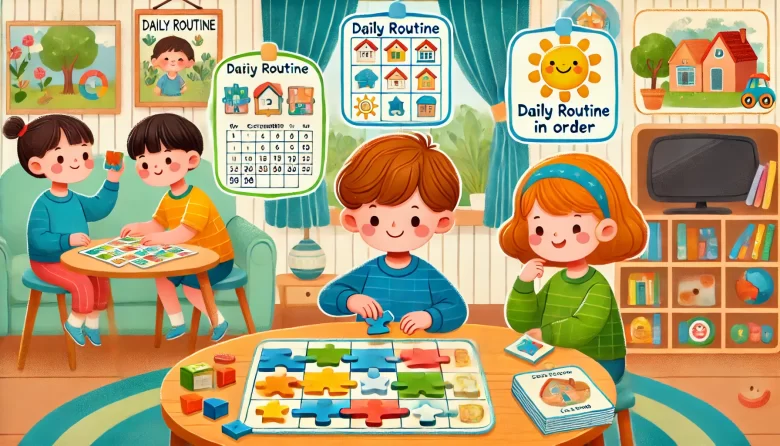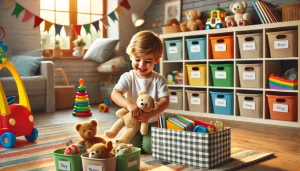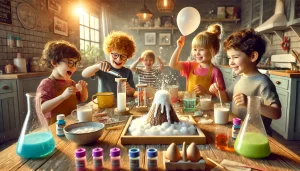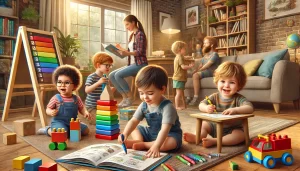Developing logical thinking in children is a crucial aspect of their cognitive growth. Logical reasoning helps kids analyze problems, make decisions, and understand cause-and-effect relationships. However, learning logic doesn’t have to be a dull, rigid process. By incorporating fun and engaging activities into their daily routine, parents can help children enhance their logical thinking while also promoting organization skills.
In this post, we will explore interactive and creative activities that make learning logic enjoyable. These exercises will not only boost critical thinking but also teach children the importance of routine and organization.
The Importance of Logical Thinking and Organization in Early Childhood
Logical thinking helps children develop problem-solving skills, reasoning abilities, and structured thinking. When combined with organization, it allows kids to manage their time, follow steps in a sequence, and complete tasks efficiently.
Benefits of logical thinking and organization include:
✅ Improved problem-solving skills
✅ Better decision-making abilities
✅ Stronger memory retention
✅ Enhanced creativity
✅ Increased independence
Now, let’s explore some exciting activities to help kids develop these skills in a fun and engaging way!
Puzzle Challenges: Building Logical Sequences
🧩 How to Play
- Use jigsaw puzzles, pattern recognition puzzles, or number sequence games.
- Ask your child to arrange pieces in a logical order, such as completing a picture or following a numerical sequence.
- For an extra challenge, create a story puzzle where kids must arrange images in the correct cause-and-effect sequence.
🎯 Skills Developed
- Pattern recognition
- Problem-solving
- Sequencing and spatial reasoning
🔹 Make It More Fun!
- Set a timer to add an exciting challenge!
- Turn it into a family competition to solve puzzles together.
3. The “What Comes Next?” Game
🎲 How to Play
- Show your child a sequence of objects, colors, numbers, or actions and ask, “What comes next?”
- Examples:
- 🟠 🟢 🟠 🟢 ___? (Color patterns)
- 🚗 🚕 🚙 🚗 🚕 🚙 ___? (Vehicle patterns)
- 2️⃣, 4️⃣, 6️⃣, 8️⃣, ___? (Number sequences)
🎯 Skills Developed
- Logical reasoning
- Critical thinking
- Pattern recognition
🔹 Make It More Fun!
- Let your child create their own sequences and challenge family members!
Organizing Toys by Categories
🏗️ How to Play
- Give children a box of mixed items (toys, objects, or cards).
- Ask them to group similar items based on categories such as:
- Color
- Shape
- Function (e.g., all vehicles together, all animals together)
🎯 Skills Developed
- Classification skills
- Organizational thinking
- Attention to detail
🔹 Make It More Fun!
- Turn it into a race: “Can you sort all the toys in 2 minutes?”
Daily Schedule Sorting Game
⏳ How to Play
- Create cards with different daily activities (e.g., waking up, eating breakfast, brushing teeth, playtime).
- Shuffle them and ask your child to arrange them in the correct order of a daily routine.
🎯 Skills Developed
- Logical sequencing
- Routine building
- Time management
🔹 Make It More Fun!
- Let kids design their own routine chart with drawings or stickers!
DIY Escape Room: Solving Clues
🔑 How to Play
- Create a mini escape room at home with hidden clues.
- Each clue should be a logical puzzle (e.g., a riddle, a pattern, or a number sequence).
- Solving each clue leads to the next, with a final reward at the end.
🎯 Skills Developed
- Problem-solving
- Deductive reasoning
- Teamwork (if played in a group)
🔹 Make It More Fun!
- Use a treasure hunt theme with a small prize at the end!
Cooking with Logical Steps
🍽️ How to Play
- Choose a simple child-friendly recipe (e.g., making a sandwich or mixing a smoothie).
- Ask your child to follow the steps in order.
- Discuss why each step is necessary (e.g., “What happens if we don’t mix the ingredients?”).
🎯 Skills Developed
- Sequential thinking
- Planning and organization
- Cause-and-effect reasoning
🔹 Make It More Fun!
- Let kids invent their own recipes and explain the logic behind them!
Memory and Matching Games
🃏 How to Play
- Use memory card games with matching pairs.
- Start with simple matches (e.g., identical pictures) and move to more complex associations (e.g., an object and its function).
🎯 Skills Developed
- Cognitive flexibility
- Logical connections
- Short-term memory
🔹 Make It More Fun!
- Play against a timer or in a team competition!
Building and Engineering Challenges
🏗️ How to Play
- Give children blocks, LEGO, or household items to create structures.
- Ask them to follow a specific pattern or challenge, such as:
- “Build the tallest tower that can stand on its own.”
- “Create a bridge that can hold 5 small toys.”
🎯 Skills Developed
- Structural logic
- Creative problem-solving
- Spatial awareness
🔹 Make It More Fun!
- Set up mini-engineering competitions with siblings or friends!
Final Thoughts: Learning Through Play
Encouraging logical thinking doesn’t require rigid drills—it can be an exciting adventure! These activities help children develop critical thinking, organizational skills, and structured reasoning while having fun.
By integrating these exercises into daily routines, children learn the importance of planning, sequencing, and problem-solving, all of which are essential life skills.
🌟 What’s Next?
Try these activities with your child and observe how they improve their logical thinking over time. Do you have any favorite logical games? Share them in the comments!




